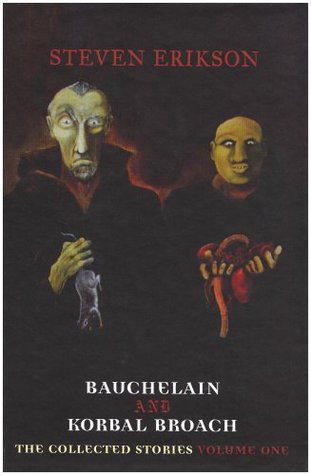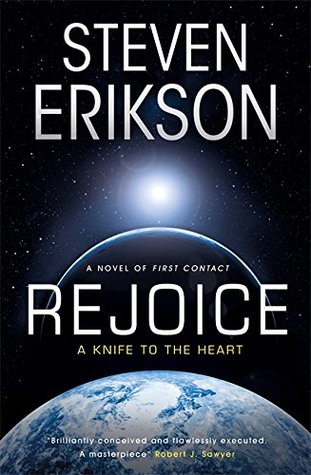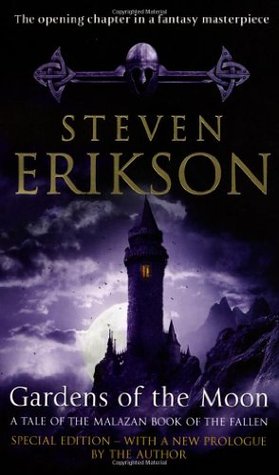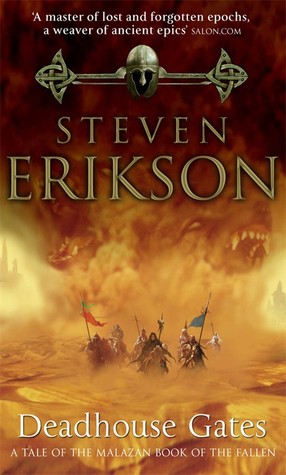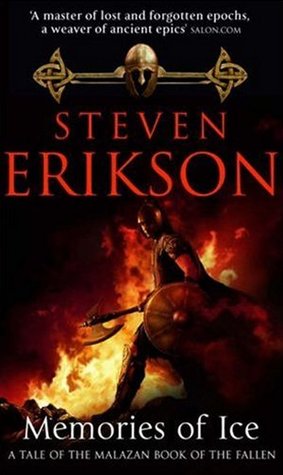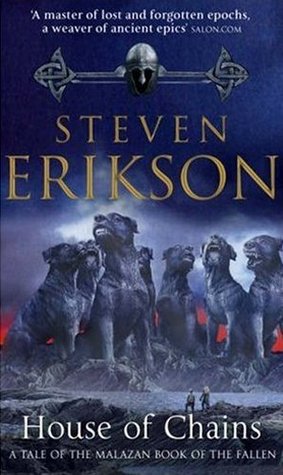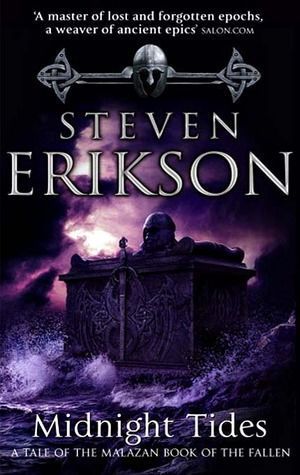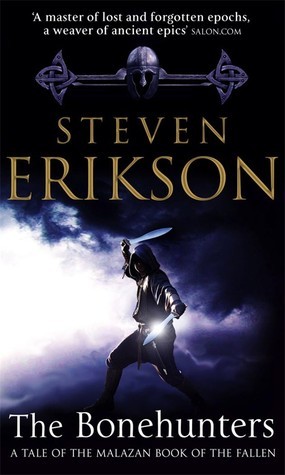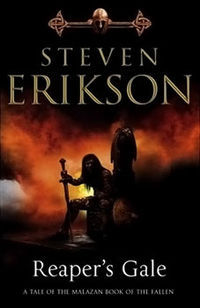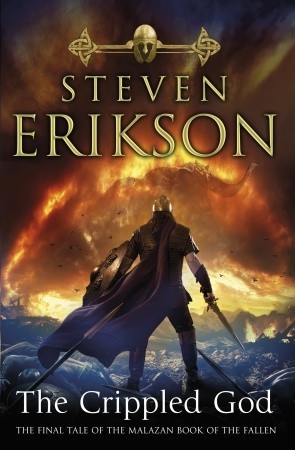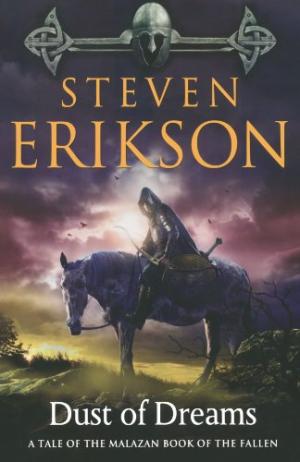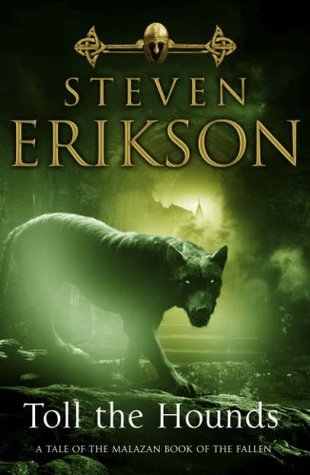Interview with Steven Erikson
 Steven Erikson, the author of the Malazan Book Of The Fallen series, is a figure who surely needs no introduction to the readers of The Fantasy Hive. His latest novel, Rejoice: A Knife To The Heart, released in October from Gollancz, and sees him turning to science fiction. Rejoice is a powerful, thought-provoking first contact novel that uses Erikson’s in-depth character work to look at the effects of an alien intervention on the lives of people across the globe. Meanwhile, die-hard Malazan fans need not feel abandoned because in April 2019 the second volume of the Bauchelain and Korbal Broach novellas, comprising The Wurms Of Blearmouth, Crack’d Pot Trail and The Fiends Of Nightmaria, will be released by Bantam. Steven Erikson was kind enough to agree to speak with The Fantasy Hive via phone.
Steven Erikson, the author of the Malazan Book Of The Fallen series, is a figure who surely needs no introduction to the readers of The Fantasy Hive. His latest novel, Rejoice: A Knife To The Heart, released in October from Gollancz, and sees him turning to science fiction. Rejoice is a powerful, thought-provoking first contact novel that uses Erikson’s in-depth character work to look at the effects of an alien intervention on the lives of people across the globe. Meanwhile, die-hard Malazan fans need not feel abandoned because in April 2019 the second volume of the Bauchelain and Korbal Broach novellas, comprising The Wurms Of Blearmouth, Crack’d Pot Trail and The Fiends Of Nightmaria, will be released by Bantam. Steven Erikson was kind enough to agree to speak with The Fantasy Hive via phone.
Your new novel Rejoice: A Knife To The Heart is out from Gollancz now. Would you be able to tell us a bit about it?
The novel is basically a thought experiment. Primarily I read science fiction and science non-fiction. I know it sounds strange for a Fantasy author but that’s how it’s been for the last twenty years or so. And one of my subgenre favourites is first contact novels. For the longest time I’m basically reading every first contact novel written in English that I can find – with a growing sense of frustration. And as much as I absolutely adore so many of these novels (Patrick Tilley’s Fade Out (1975) always stands out for me as one of the great first contact novels, that is not very well known, which is a bit of a shame. It’s simply terrific. And of course [Larry Niven and Jerry Pournelle’s] The Mote In God’s Eye (1974) and various other first contact novels, most recently Jack McDevitt’s), this frustration was building in a sense that my suspicions were that we carried a lot of assumptions into something as profound as first contact. A lot of these are very very human based, very structured on our own value system. And that always struck me as a bit absurd, and a bit of a conceit, to actually consider any species that could travel the galaxy as being in any way socially structured in similar ways that we are, in terms of their value systems. So basically the novel is approaching this from a slightly different point of view, quite explicitly ET rejects a lot of our assumptions about how sentient species and civilisations operate. And so once I set up the premises, once I set up the assumptions, I just simply sat back and took a handful of characters and wrote about them. And wrote about how they would experience what I would consider to be probably the most fundamental and crucial existential crisis humanity would ever experience, which would be first contact.
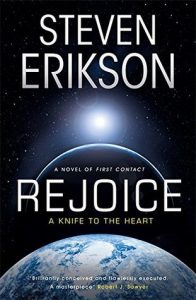 The novel feels very much in conversation with works like Arthur C. Clarke’s Childhood’s End (1953), but also the big Hollywood blockbuster first contact stories. The characters explicitly discuss Close Encounters Of The Third Kind (1977) and Independence Day (1996)…
The novel feels very much in conversation with works like Arthur C. Clarke’s Childhood’s End (1953), but also the big Hollywood blockbuster first contact stories. The characters explicitly discuss Close Encounters Of The Third Kind (1977) and Independence Day (1996)…
Well, I mean, to take those two examples, Close Encounters Of The Third Kind, and Independence Day, and to put them against our historical backdrop, is quite shocking isn’t it, if you think about it. The optimism of Close Encounters – I saw that in the cinema, and it just floored me. I was just probably in my twenties or something, but I came out of there high as a kite and hopeful. And then what, two or three decades later, we get to Independence Day which is paranoia to the extreme. And that transition is I think reflected in our political transition through that time period. That growing cynicism and a loss of faith in the future. I suppose I’m writing partly in response to that kind of stuff. I’m also writing in response to, being a Trekker, the whole premise of the prime directive, which I find to be utterly objectionable. I wanted to counter that with something along the lines of, no, it’s not going to be ‘hands off a struggling species’, it’s going to be all in, in terms of intervention. Which generates a whole series of ethical issues regarding free will, regarding sentient species. Things to explore.
The big joke about the Prime Directive in Star Trek, and I say this as a massive fan, is that they find it very hard to write an episode in which the characters don’t interfere with another species in some way.
Yeah, absolutely. And the reason is it’s fundamentally flawed. And so as soon as you apply any kind of moral context to it, you realise it’s, as a directive, as a kind of rule to run by, it is potentially horrendous. It’s the equivalent of looking at a species that is racing to the edge of a cliff of self destruction and saying, ‘no, we have to let them develop on their own’, and it’s planetary genocide. So how on Earth can you reconcile that with the underlying morality of Star Trek? You simply can’t.
The novel attacks that human arrogance that the aliens come all that way and the humans are the only thing they’re interested in. They’re interested in protecting the entire biome.
Yeah, and I guess that’s partly in terms of my thought experiment me throwing up my hands in despair. We can fix it, we just won’t. And so this is a case of someone else stepping in and saying, ‘you’re fired, and we’ll take over from here’.
There’s a lot of anger that comes through at our own complacency over things like climate change but also the resurgence of the far right and the way our political systems are falling apart over the past five or ten years.
Yeah, maybe anger; from a anthropological point of view and a historical point of view it’s all fairly predictable. The more scarcity there is, and however you want to define that, not just in resources but in opportunity as well, the higher the stress level. And then as the situation worsens, we pull up the drawbridges, and so we think in terms of protecting only our own, and everyone else is an adversary. That kind of attitude is very much I think what drives the political right. That, and then that strange contradictory appeal to authority, and the most authoritarian personages that arise at these things. They offer kind of a panacea that’s completely false, and yet it’s very appealing in a romanticised sense, and so people then gravitate to that notion of the Great Leader. It’s not too surprising.
In particular you play directly with that and Trump in the character of Raine Kent…
The weird thing was, I started the novel before the election, and I figured if Trump didn’t get it, Trump version 2 would get there next. So I finished in May, I can’t remember when the election was, but it was coming round to the time where I start throwing in a few little details, pudgy fingers or whatever, since it seemed fairly clear either he’d been elected or was about to be elected. But my characters are analogues. There’s very little we can actually understand of political individuals’ personality, everything is massively filtered, so it would be presumptuous to assume I could understand or know that kind of person. So I created my own versions. Same for the Russian president and the Chinese premier as well. Again, analogues. I wanted that notion, what happens to these people when all their power disappears. When our entire political system becomes utterly irrelevant in terms of nationalism, in terms of maintaining order, all of these sort of territorial impulses that seem to drive so much of the human conflict, suddenly all disappear and is no longer available to us. Then what? So that’s kind of where those characters are coming from. And I have great sympathy in a sense, because they are products of the system, and then the system just suddenly stops. Then what? What do you do? That raises huge questions.
I found your treatment of the characters interesting in that way. The book is unflinching in its portrayal of the failings of humanity – there’s the arms dealer, the warlord in DRC, the horrible misogynist wife-beater – but there’s a real look at why each of these people are the way they are and what happens when the system that created them stops existing.
Yeah, and I can’t help but have great sympathy for each of those characters. Because we are products of a kind of flow of ethos, of a changing ethos, and most of us don’t feel in control. So generally our responses are to control what we can, and sometimes that can turn aggressive, or turn destructive in a broader sense. I’m writing about various extremes, so we’ve got a gun dealer, we’ve got a child soldier, we’ve got a character who takes out his frustrations on his wife and his child, but in many respects again they’re simply reflections of the kinds of struggles each of us face on a regular basis. And so rather than sort of write them all, all I could do is kind of ring a few bells here and there. But fundamentally the struggles that they are all experiencing are the ones we all experience. That sense of helplessness – I mean, we can follow the weather reports and we can see climate change delivering its message. And most of us, okay, we can compost and we can recycle, but it feels so pointless in affecting any kind of change, because there is a kind of blind momentum that seems implicit. At least in a capitalist system, but that’s in the extreme. Any system, archaeologically you can look back. I remember standing on the great pyramid in Guatemala, in ‘83, and I walked around and I imagined to myself, well, there was a time when a high priest was here looking out on the Mayan empire, and in all directions seeing nothing but farmland, farm after farm, and then thinking, and no doubt believing, that this was going to last forever, and there I was, standing there 350 years later, 400 years later, and there was nothing but jungle around me. Nothing but jungle. But every civilisation has that belief in its immortality and ours is no different.
One of the big themes of the book is exploring humanity’s lack of agency in the face of things larger than themselves.
Yeah, and it gets worse. The more of us there are, the less control we have! It does get worse. And the capitalist ethos, a lot of it is pushing us towards numbing us. It’s very much the Aldous Huxley Brave New World opiate, to use Marx’s phrase. And so those distractions are very effective. There’s a lot of smart people put together great selling ads and promotions and all the rest, and we just go to the light like a moth. It can be frustrating, but it’s also quite recognisable and quite understandable, and I have great empathy for the situation we’re in. So of course in a speculative fiction novel or a science fiction novel you can take that and say, well, alright, let’s deliver the slap of reason and see what happens.
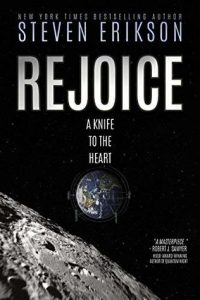 There’s some really nice discussion in the novel about the difference between mechanistic and spiritualistic approaches of looking at the universe, in particular in Samantha August’s little epigraphs at the beginning of each chapter…
There’s some really nice discussion in the novel about the difference between mechanistic and spiritualistic approaches of looking at the universe, in particular in Samantha August’s little epigraphs at the beginning of each chapter…
They came late actually. I didn’t have those epigraphs. In the first draft the only one I actually had was the quote from Samantha August that she sends to her husband, which is something along the lines of, in space nobody cares if you smoke. And that was actually the very first one. And then I thought, well, it might be useful if we’re going to make her a blogger to start quoting other stuff. But I didn’t want to quote stuff that was very directly in response to what was going on in the story, cause all of these quotes are presumably from before her abduction. I also wanted to give a tip of the hat to all forms of spiritualism which I think tend to get denigrated in a lot of science fiction. It’s either dismissed as sort of the most benighted aspect of humanity, and the bad guys usually are fundamentalist religious entities, even in a lot of really broad epic style science fiction. And I guess a part of me wanted to say, well, hold on a minute, we can actually approach this from both sides. And I did mention earlier I read a lot of non-fiction science novels, so I’m reading a lot about biosentientism, and that kind of merging of the most recent quantum evidence, quantum physics, related to people like László, people who are writing about both Eastern, Vedic spiritualism and merging it with a kind of vision about universal consciousness, and then merging that with quantum experimentation. So I read a lot of that stuff. So I thought, okay, well, let’s throw that in as a kind of counterpoint to all the heavy science and the high tech kind of mechanistic approach to the universe. And the more I read, the less I’m convinced of the mechanistic model anyways, so it kind of fit. You look at the biome, and you look at how delicately balanced the whole damn thing is, and over and over again it’s just, you think, well okay, the general theories of evolution all talk about gradualism, and it doesn’t seem to be logical or rational that that slow pace of gradualist movement is even reflected in what we’re seeing. But that’s a whole different discussion.
You’re most famous for the Malazan novels, but this book is very different being a high concept science fiction novel. How different are the approaches in writing something like that and writing Fantasy?
Well, it underscored for me just how difficult fantasy is compared to any other genre. Once you’re worldbuilding, the pressure that’s on you, in terms of how you describe that world, and how you have to truncate your own language to convey those antiquated, atavistic elements. And then you switch that up with something like a mimetic novel, which is what Rejoice primarily is, and a mimetic novel is so easy to write. It’s so relaxing. I flowed through it, and it was with great delight that I did so. I guess I’d grown so used to carrying that pressure with an invented world, where you cannot just say, this character is in the city of Paris, and have every reader expect to know enough about Paris to be able to place that character. If I were to say, someone’s in the city of Pale in Genabackis, well, no one knows what the hell that is, or what world that’s on, so suddenly I have to do a lot more work. So mimetic novels are a delight. And I find it so ironic that so many literary authors will disparage epic fantasy without clearly understanding just how hard it is, and I would challenge any of them to sit down and write the damn thing and see for themselves. Because it is the hardest genre you can possibly write.
There’s a massive difference in scope as well.
Yeah, I was younger then, I had more ambition. And also as a thought experiment, you don’t necessarily want to run it into exhaustion. I have a sequel in mind, if the book does well I will follow up. And it will be another sort of fundamental shift that will occur in that novel so it’s not just repeating this first one.
The second collection of Bauchelain and Korbal Broach novellas is out with Bantam. Would you be able to tell us a bit about that?
Whenever I need a real break, I sit down and write one of those novellas. And so this volume two is the middle collection of three, I have three more after this to write. And yeah they’re just good fun to write. Generally they’ve been coming out with PS Publishing, and Sub Press in the States handle them initially, although Tor did issue them. They’re a nice break. They’re set in the Malazan world but they’re a bit more direct in their comedic intent and their satirical intent than my general Malazan novels.
They must feel relaxing as well because they’re happening away from the mechanics of the grand plot of the ten novels in the sequence.
Yeah, and they’re sort of my answer to Fafhrd and the Gray Mouser by Fritz Leiber, they’re my homage to them. By reversing everything so that you have the two most horrendous necromancers possible as the two primary driving forces of the stories, but the point of view is from their manservant who actually prefers them over staying at home with his wife. It’s a lot of fun to write. And yeah, I can put a lot of fantasy tropes through that, as I certainly did with The Fiends Of Nightmaria and I think that’s the one where I did the RPG group basically, and just had fun with them.
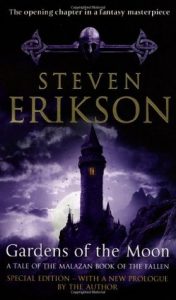 When you’re creating something as complex as the Malazan Book Of The Fallen, how do you go about planning something that massive?
When you’re creating something as complex as the Malazan Book Of The Fallen, how do you go about planning something that massive?
You know what? I look back on it and I literally can’t remember how I pulled that off! I started Gardens Of The Moon in 1991 or ’92. And wrote the draft, couldn’t get a publisher, living in Canada at the time, and even then I sort of had in my head where this is going to go, and that there were going to be 10 books in all. Which I knew I wasn’t going to ever bring up when pitching the project, we initially pitched it as a trilogy. Just, I didn’t want to scare anybody away. Because you know, you make that promise as an unproven writer, and it’s a pretty major promise. But I had scenes that were towards the end of the tenth novel sitting in my head for fifteen years. So then it was a question of, well, what I have to do is be patient enough to take my time getting there, because if I wanted any sort of emotional context to those scenes, as I felt viscerally when I had them in my head, I had to sort of prepare the reader. And in some respects it took almost all ten novels to prepare the readers for those final scenes. And I had immense ambition at the time and was driven, very driven. Once I’d got the green light for the ten-book series there was really no stopping me. And there was even a fear of dying before I could finish it! I remember being struck by a quote I read somewhere, when Robert Jordan was in his last few years, at a signing where he signed a book for an elderly woman who expressed a fear of her dying before he finished the series. And of course the bitter irony being Jordan himself dying before he could finish the series. And the closer I got to it, there was a disastrous decision to do some archaeology in Mongolia between books nine and ten, and then that almost killing me, from a stomach bug, and then a spider bite, it just started getting ridiculous. And then I realised if I keeled over in Mongolia between book nine and ten, wherever my gravestone was in the world people would annually piss on it, so I thought okay, I got to get this thing finished. And came back, I was living in Falmouth at the time, so I came back to Cornwall and just wrote my ass off and got it done. So fear can be a driving force in these things.
You created the world with Ian C. Esslemont, who’s also written his own series set in the same world. What’s it like sharing your baby with another writer?
Well, it’s like two parents sharing a baby: you equally contributed to whatever genetic progeny you produce. So if you look at my dedication to Gardens Of The Moon, it’s basically to Ian Esslemont, ‘worlds to conquer, worlds to share’. And when I said that, I was saying that to reassure him, because nobody else knew he was going to step forward and write some Malazan novels. But I wanted him to be very clear that it was a shared world as far as I was concerned and the door was open for him. So he picked that up and dropped the PhD he was doing at the time and had to rethink his future. And I’m so pleased that his latest trilogy, Origins of Empire, is doing so well. He seems to have found his stride in terms of narrative length and he’s just clearly having great fun writing that stuff. And that’s the stuff we actually gamed so that’s a lot of fun for me. I get to tap in and see what he’s up to, and how he remembers things versus how I remember things, and then how these things change for the purposes of fiction. It’s a lot of fun.
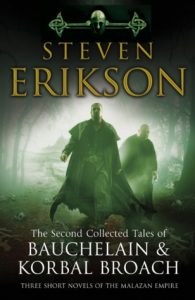 When you are both writing, is it an entirely independent process or do you brainstorm together?
When you are both writing, is it an entirely independent process or do you brainstorm together?
We do meet up once a year at the international Conference of The Fantastic and The Arts in Orlando in March, and we pull ourselves away from the pool bar for a while, and sit and just bounce things off to make sure that I know what he’s up to and he has some idea of what I’m up to. But we don’t put any particular pressure on each other at all. This is a world we co-created and we’re just having fun exploring it. I sort of have an idea what he’s planning next after this trilogy, cause he’s finished the third one, and that’s pretty cool too, so that should be a lot of fun.
Given that we live in this new golden age of Fantasy TV adaptations, with Game Of Thrones, Shannara, Wheel Of Time being worked on…
And Black Company, that’s the one that’s got me excited, I really have fingers crossed they do it well.
Yeah, it would be really interesting to see what they do with that one. Have any of your books come under option?
We got very close. And I have mentioned this before, and it did make its rounds so there’s no point in keeping quiet on it, because it’s an interesting story. We negotiated a contract for the first three books with a major producer in California, in LA. Had a handshake agreement, took a long time to get the contract finalised, signed the contract, waited for our option check, and waited and waited and waited, and then we were informed that it had basically been shut down through a lack of cash flow, something along those lines. The person whose desk that was sitting on was Harvey Weinstein, it would have been through the Weinstein Group. So in that respect, because the Weinstein Group subsequently went into receivership, in a sense I guess we dodged a bullet. ‘Cause you don’t know what happens to properties that are owned in companies that go into receivership, they tend to be auctioned, and there’s very little control over where that goes. Granted, it would have been an 18-month auction, but even still, that’s how it turned out. Right now I’m back out now marketing the thing, so we’ll see how that turns out.
What’s next for Steven Erikson?
Well, I’m working on a trilogy set about ten years after the Malazan Book Of The Fallen. So Karsa Orlong is one of the characters, kind of circling around his story, what happens after the main series with him. So that’s what I’m working on at the moment.
Thank you Steven Erikson for speaking with us!
Steven Erikson is the author of The Malazan Book of the Fallen and the science fiction novel Rejoice: A Knife to the Heart, available now.


